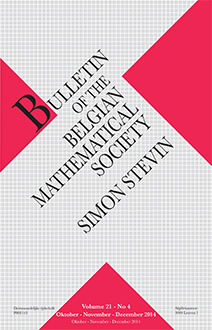Abstract
A coproduct on a vector space $A$ is defined as a linear map $\Delta:A\to A\ot A$ satisfying coassociativity $(\Delta\otimes\iota)\Delta=(\iota\otimes\Delta)\Delta$. We use $\iota$ for the identity map. If $G$ is a finite group and if $A$ is the space of all complex functions on $G$, a coproduct on $A$ is defined by $\Delta(f)(p,q)=f(pq)$ where $p,q\in G$. We identify $A\otimes A$ with complex functions on the Cartesian product $G\times G$. Coassociativity follows from the associativity of the product in $G$. Unfortunately, sometimes this usual notion of a coproduct is not the appropriate one. Just think of the above example for an infinite group. For this reason, we consider the case of a coproduct on an algebra $A$, not necessarily unital but with a non-degenerate product. It is a linear map from $A$ to $M(A\otimes A)$, the multiplier algebra of $A\otimes A$. It is no longer possible to express coassociativity in its usual form as the maps $\Delta\otimes\iota$ and $\iota\otimes\Delta$, defined on $A\otimes A$, may no longer be defined on the multiplier algebra $M(A\otimes A)$ (which in general is bigger than the algebra $A\otimes A$). We will see how this problem can be solved in different ways. There is a similar issue when we want to use the coproduct to make the dual space into an associative algebra. Also this problem is discussed. We refer to the literature on multiplier Hopf algebras and related structures. We also include some examples to illustrate these problems and the solutions proposed in this paper.
Citation
Alfons Van Daele. "Coproducts for non-unital algebras." Bull. Belg. Math. Soc. Simon Stevin 31 (5) 593 - 627, December 2024. https://doi.org/10.36045/j.bbms.240207
Information





